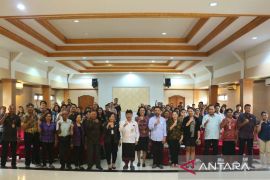Jakarta (Antara Bali) - Vice President Jusuf Kalla has cautioned about the huge amount of foreign funds, to the tune of Rp97 trillion, which will be deposited with banks at home.
"The funds in US dollars are deposited with banks as reserves. This means that we will be paying what is not necessary. So, caution should be exercised regarding big amount of incoming funds," the vice president said here on Tuesday.
He called for using the inflow of foreign funds to repair the Indonesian economy because if these are only deposited with banks, the government will end up merely paying interest.
"The interest rate overseas is zero percent while at domestic banks, it is eight percent. So, if the foreign funds are only kept with the banks, then we will be paying eight percent interest without using the funds. So, we should be cautious regarding the matter," he added.
Bank Indonesia (BI/the Central bank) reported that since early this year and up to June 24, 2016, the incoming foreign funds amounted to Rp97 trillion, up by 70.1 percent compared to the same period last year when the figure was Rp57 trillion only.
BI Governor Agus Martowardojo argued that foreign funds supported the strengthening of the rupiah currency which continued to hover at around Rp13,100 per US dollar over the past several days. The increasing amount of incoming foreign funds is construed by the BI as indicating an improvement in the Indonesian economy.
Meanwhile, Agus continued, with the endorsement by the House of the Tax Amnesty Law, market players and investors are also having more and more faith in the economy.
Agus was convinced that with the implementation of the tax amnesty law, the inflow of foreign funds by April 2017 would be able to help support the strengthening of the rupiah. However, the BI will keep exchange rates stable, preventing them from being too weak or too strong and keeping them close to their fundamental value. (WDY)








